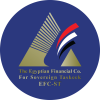Sub-Committees from the Board of Directors
The Audit Committee:
The Board of Directors form the Audit Committee so that it performs its work independently. There must be a work regulation approved by the Board for the Audit Committee, which determines its scope of work, responsibilities, and specifications in accordance with the laws and regulatory instructions. To achieve the Audit Committee’s independence, the Committee must choose its Chairman; its formation, the criteria for selecting its members, its working program, the financial compensation of its members, and its Chairman must be approved and assigned to perform its duties pursuant to a decision issued by the Board of Directors.
The Audit Committee is formed of non-executive, independent members of the Board of Directors or from outside the company, provided that at least one of them must have knowledge and expertise in financial and accounting matters.
The Audit Committee must at least undertake the following tasks:
– Studying the financial statements before presenting them to the Board of Directors and providing opinions and recommendations regarding them
– Studying the accounting policies used and giving their opinions and recommendations regarding them. – Review the auditor’s plan and give comments thereon.
– Studying the auditor’s comments and recommendations on the financial statements and others included in the management letter received from the auditor, and follow up on what has been done regarding them.
– Ensuring the company’s commitment to following internal and external systems, regulations, and laws in accordance with the reports submitted to it by the Compliance Department or other relevant departments.
– Discussing and approving the annual plan of the Internal Audit Department, following up on its efficiency, and ensuring its comprehensiveness for all departments and activities of the company.
– Reviewing internal audit reports, identifying shortcomings and reasons behind them, and following up on corrective actions.
– Studying and evaluating information and data security systems and how to protect them from any internal or external breaches.
– Studying observations or violations received from regulatory authorities and follow up on what has been done regarding them..
– Inviting the company’s auditor, head of the internal audit department, or whoever it deems appropriate from inside or outside the company to attend its meetings whenever necessary.
– Implementing and following up on any other work assigned to it by the Board of Directors.
The Risk Management Committee:
It is a committee formed of non-executive and independent members of the Board of Directors. The Managing Director, the Company’s Risk Management Manager, or any of the Executive Directors may be invited to attend its meetings whenever necessary.
The Risk Management Committee must at least undertake the following tasks:
– Assisting the Board of Directors in identifying and assessing the level of risk that the company can accept, and ensuring that the company does not exceed this risk limit.
– Supervising and verifying the effectiveness of the company’s risk management in implementing the tasks assigned to it, and ensuring that it performs its work adequately within the limits of its assigned competencies, as well as ensuring the independence of the risk management staff from the company’s executive management.
– Preparing a periodic report on the results of its work and its recommendations to be presented to the Board of Directors to take the necessary action in this regard.
The Governance Committee:
A committee formed of non-executive and independent members of the Board of Directors.
The Governance Management Committee must at least undertake the following tasks:
– Preparing an annual report on the company’s compliance with corporate governance rules, with appropriate procedures in place to complete the application of those rules.
– Reviewing the company’s annual report and the board of directors’ report, especially with regard to disclosure items and other items related to corporate governance.
– Preserving, documenting, and following up on reports on evaluating the board’s performance.
– Studying the observations of the regulatory authorities on the application of governance in the company, considering them, and following up on what has been done in this regard.
The Investment and Asset Management Committee:
The Investment Committee is formed from executive and non-executive members of the Board of Directors and from those with experience in the company or from outside the company.
The Investment and Asset Management Committee must at least undertake the following tasks:
– Submitting any comments or suggestions on the feasibility study or executive steps at the various development stages.
– Submitting a report on investments according to their use for the purposes for which they were issued.
The Legitimacy Supervisory Committee:
It is a committee composed of specialists in the fields of finance, economics, law, and Islamic Sharia, which is responsible for verifying dealings on sovereign sukuk from their issuance until their value is recovered in accordance with the principles of Islamic Sharia and other specializations stipulated in Law No. (138) of 2021. The Committee should consist of a chairman with economic expertise and six part-time members, three of whom shall have expertise in the field of finance, a legal member, nominated by the competent minister, and two with expertise in Islamic Sharia, nominated by the Grand Imam of Al-Azhar Al-Sharif. It is permissible to include a foreign expert with expertise in Islamic finance, nominated by the Grand Imam of Al-Azhar Al-Sharif in consultation with the competent minister.
The Legitimacy Supervisory Committee is responsible for the following:
– Approving that the issuance prospectus and all contractual forms for issuing sovereign sukuk are compatible with the principles of Islamic Sharia.
– Verifying that dealings in sovereign sukuk continue from their issuance until their value is recovered in accordance with the principles of Islamic Sharia, either by itself or based on periodic reports requested by the relevant authorities.
2025 Copyrights ©

